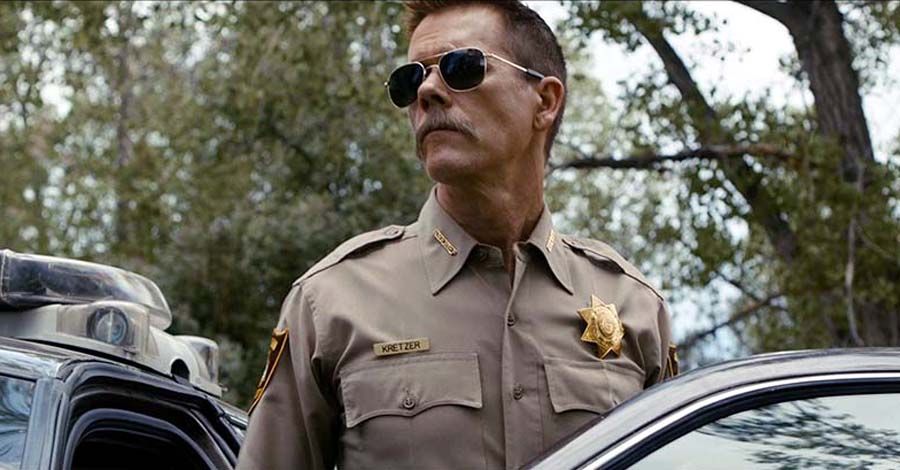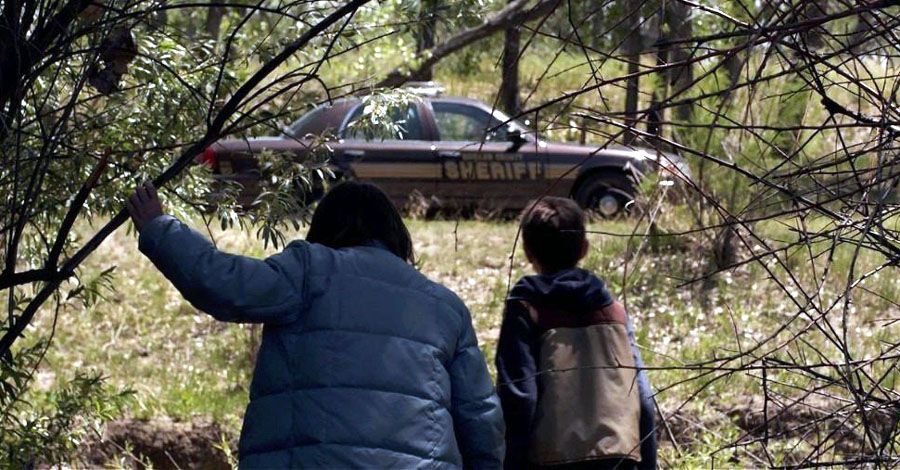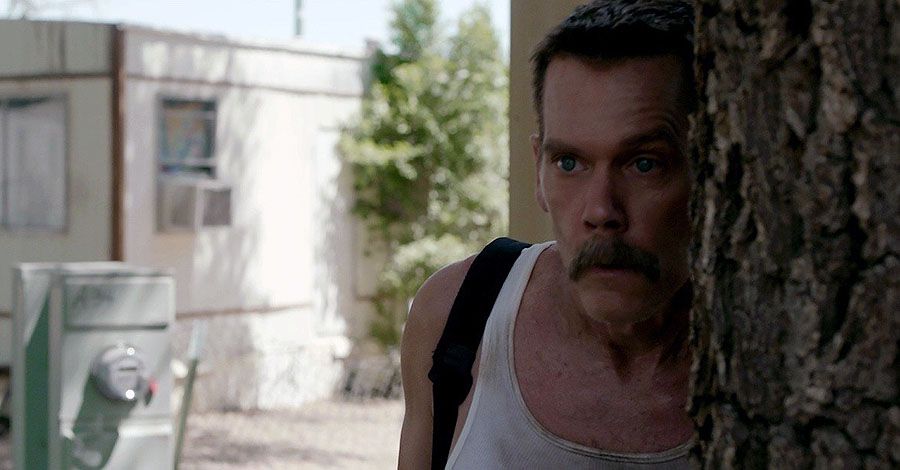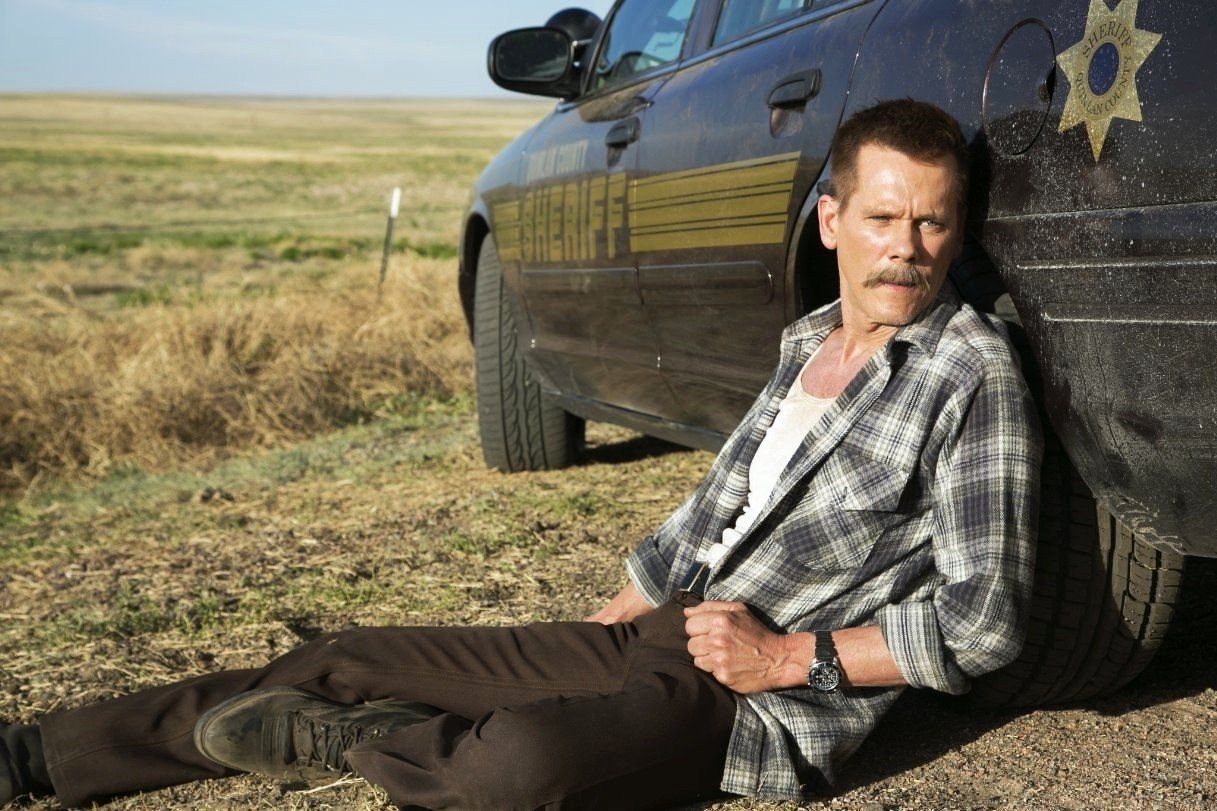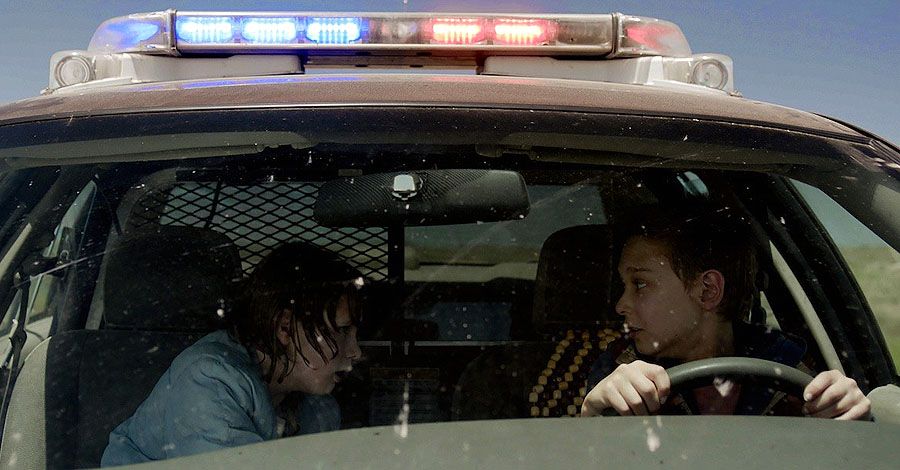With "Cop Car," a fusion of Amblin-style backyard adventure and gritty, corruption-fueled crime noir, filmmaker Jon Watts announces himself as a cinematic natural, aided and abetted by a stiletto-sharp performance by star Kevin Bacon.
For fans of superhero cinema, that’s amazing news, given that on the strength of "Cop Car's" early buzz and his previous film "Clown," Watts landed the coveted job directing the next Spider-Man movie, co-produced by Marvel Studios and Sony Pictures.
However, it's even better news for film lovers in general, as "Cop Car" clearly demonstrates that Watts has a promising career behind the camera in any genre, and that after nearly four decades in the business Bacon – the villain of 2011's "X-Men: First Class" and name-checked as himself in "Guardians of the Galaxy" – still has fiery, knockout performances up his sleeve.
Spinoff Online: I really loved this sort of Spielberg-ian adventure-meets-crime-noir drama. How did that merging of concepts come together for you?
Jon Watts: This Spielberg thing comes from just being a kid who was 10 years old in 1991. That was my whole life -- all my friends. It was, like, Amblin Entertainment, that's all we watched. And so when you go out walking out in the field behind your house – we shot the movie right where I grew up – you're hoping that you're going to end up in one of those movies, basically. You're hoping that you're going to stumble across, like, the “Goonies” treasure or find that thing that makes that orb glow, you know, in "The Explorers" and get taken up into space. You're hoping to find E.T.
So Amblin and my childhood are interconnected in that way. But then I wanted to tell a movie that maybe starts off with that magic and then ends up in the real world. And when you start asking the questions about, "Yeah, it's very cool and magical for two kids to find a police car – but then, whose police car is it, and why is it out in the middle of nowhere?" You can't help but get into crime-genre world.
Kevin, what was it that you saw on the page that made you say you want to do this?
Kevin Bacon: I saw the movie. Like, it's strange to say, because there's people who've commented on the fact that there's so little dialogue in it. But there was something about the script and the way that Jon and Chris [Ford, the co-writer] created that made me feel like I had seen the movie once I finished it. And it was a movie that I liked and a character that I wanted to play.
There's a spareness of the dialogue throughout, yet so much is communicated. Was that a bit of an acting challenge as well?
Bacon: Well, I started out as an extra, so I had no dialogue. So when you start in that way, you start to rate your parts based on how many lines you have, and that's kind of like a progression that you make up the ranks of being an actor. So you have to break yourself away from the idea eventually, that the richness of the role is based on the words that come out of somebody's mouth. Because the great thing about a camera is that you can tell a story that we can't tell with the human eye, that goes deeper and has to do with a look, a movement, a gesture, details of someone's world, of the place where they live, of the kind of clothes that they wear and the car they drive and all these things.
So I like that. I mean, I think it's great, and I think it's a great challenge. And it's actually a great opportunity, in a way. And I also think that I'm a fan of not necessarily – sometimes it works – but you don't necessarily have to lay everything out for an audience. If you make them lean in and make them start to put their own theories together about who this guy is, it can be a fun experience for an audience. It is for me. So that's what I saw in the script.
And for you, Jon, to tell your story so cinematically – was that a challenging thing or easier to do it that way?
Watts: It's what I wanted to do. A friend of mine, who I went to NYU with, we were just talking about movies when I was putting it all together, and he was like, "Don't be afraid of being cinematic. Don't be afraid of trying to do that in one big, long, sweeping tracking shot." And that's so fun to do. So to be able to do that with this Western landscape was just so much fun. Trying to see how far you could push it and really only cutting when you need to.
Your actors, you've got a set of super-pros in Kevin, Camryn Manheim, Shea Whigham, and then you've got kids, Hays Wellford and James Freedson-Jackson. Tell me about balancing the acting portion between the total newcomers and the veterans.
Watts: Hays and James being the newcomers was perfect because that look they have on their faces when they're driving a cop car through a field, that's sincere. They didn't really have to fake that. And so for this to all be new to them was something we were just able to capture because it was. And on top of that, they both had like a seriousness that I was looking for when we were looking for all the kids.
We did like a big nationwide casting. And both of them felt like they would be able to think through these problems. And even though their solutions are like, 10-year-old-kid-logic solutions, you feel like they've really come to those conclusions on their own.
To have scenes with someone like Camryn, who you know you're going to have some fun with, and then the kids, where you're dealing with fresh, new excitement – tell me about the dichotomy of that experience.
Bacon: Yeah, sure, of course, working with Camryn, it's awesome. I mean, she's just there and great and interesting and funny and fantastic. The kids, they have a sense of wonder about being on a movie set, which is something I lost probably 30 years ago. And so to kind of be experiencing that is infectious, and energizing and great fun to be around.
Tell me about the look of your character, Sheriff Kretzer. Kevin, you so frequently do a great job of creating a character by how he looks and moves. Between the two of you, how did you develop how this one was going to come off?
Watts: It was nothing in the script.
Bacon: Yeah, there was nothing in the script. Sometimes you don't really get it right away. You don't hear it. You don't feel it. You know that your process is going to be about figuring that out, and you're going to have to start with some kind of internalized thing. Something about some kind of backstory and internalizing. And that's going to put the external on top of it.
In the case of "Cop Car," this is one of those ones, and I've done a few of them [snaps fingers] where I just heard him. I saw him. I dressed him. It wasn't even that much of a discovery, honestly. It's like that's what you see is what I pictured, literally, as I was reading the script for the first time. And then it was just a question of trying to talk Jon into it [laughs].
I bet you put up a huge fight, Jon.
Watts: No. It was huge fun! It was so great. It's so freeing to just have this amazing group of actors and just show up and have done all the work and have built these amazing characters. And then, if I was ever nervous like that, it immediately went away. It was like, oh, this is so much easier.
It was nice walking out of a film where you don't give us every little bit of information, and people weren't walking out of the screening saying, like, "Well, they never explained ..." Tell me about the confidence to tell your story and leave some gray areas and not have to dot every I and cross every T.
Watts: Well, when we were writing it, we were just thinking of like with "Le Samourai" or Melville movies, where sometimes you don't even know the character's names. You just know their problem, and you know what they have to do. Then you watch them do that. So we were using that maybe as a model about how much we have to explain. And I'm glad that people aren't unhappy [laughs] because we didn't know for sure. I didn't have this brilliant level of confidence that it was going to be great. I just like movies like that where not everything is over explained. So I just tried to execute it in a way that I would like.
How did you two connect?
Watts: It came through [Bacon's talent manager David] Schiff, and my fiancée.
Bacon: I didn't actually know that connection, myself – his fiancée works with my manager. But I just got the script. And my manager said, this is a cool screen – he didn't say, my colleague. That's pretty much the end of the integrity portion. No, it was a script, and I picked it up. I read the whole thing, top to bottom, no texting, no checking my email. No turning on TV. Just like page turning, bam. Over. Saw it. Good. Loved it. Went and looked at "Clown," a previous movie that Jon had done. I wasn't allowed to – it was one of those kind of like sneak up to an agency office, and there, they will give you the gold-encrusted, self-destructing DVD. And I think maybe we spoke like right after the movie or something.
Watts: I was worried he was going to see "Clown" and never hear from him again.
Bacon: "Clown" is awesome.
Kevin, coming out of a network show and still doing huge movies like "Black Mass," was this a bit of a tonic, something leaner, meaner and a little bit more to the ground?
Bacon: Only to the extent that I had a good time, but I've always been back and forth. First off, I don't make my decisions based on the budget of the film or the size of my salary --
Watts: Thank God!
Bacon: -- or the size of my role. I took those three things out of the equation quite a few years ago. And once I did that, I was at a point where there were these kind of Hollywood rules. "Well, now, you're the name-above-the-title guy, and this is your quote. And those are the studio movies that you're going to do." But it was like, all these stupid rules. And then one of the rules that people would say was, "And if that doesn't work, you're fucked. That's it. You go back to being a waiter." I was like, "Well, maybe, I've got to make some different rules." Which were: all those things don't matter to me.
I'm looking for opportunities to do what it is that I like to do, and that's act. And in this case, it was in between. I knew that we weren't getting the third season of "The Following." And in between the first season and the second season, I hadn't done any films. And I think that if nothing else, if you're on an hour-long television series, it's great, but if you finish playing that character, and especially that character on that show and the dark kind of place that he had to go, both in terms of his own internal life, but also the things that he was doing, surrounded by blood, basically – you want to walk in somebody else's shoes when you've got an opportunity to do that. That's why I became an actor.
So I was like, "I want to work as much as possible during this hiatus." And that was the second of three films that I did, all very, very different kinds of guys. And so it was great. But I didn't do the film just because I wanted to get a release from being on a TV show.
Was Kevin joining the cast was a game-changer for making the movie?
Watts: It wasn't, actually. We were in a really unique situation where I had very smart producers. Because it was a genre movie, and I guess, because of the concept in the script, they were able to get a little bit of money through foreign pre-sales. So it wasn't that we needed a big star to be attached to make it. We were going to make it for a very, very small amount of money, no matter what. And then, if we got a big star attached, that would be a bonus on top of it. So all it did was make everything so much better.
Right now, things are working out pretty well for you. Even since the Sundance Film Festival, the buzz around "Cop Car" afforded you a lot of opportunity.
Watts: Yeah, it's definitely got more attention to "Cop Car," which is great.
What's it been like where you've got a film that can benefit from that early buzz, and your career is kind of going in that direction – namely to direct the Marvel-Sony Spider-Man movie – as a result?
Watts: It's really exciting. It is a little strange that everything is viewed through the prism of a comic book movie, and how they all connect together. But it's fantastic. A lot more people are talking about "Cop Car" than they probably would be otherwise.
Are you going to bring an aesthetic to from "Cop Car" to what you do next in "Spider Man," or is this going to be a big departure stylistically?
Watts: I don't know, because we haven't written the script yet [laughs]. So once there's a script, I'll start to think about how we'll film it. But I don't know. We'll see.
Kevin, what was your experience like doing a superhero movie with "X-Men: First Class?" It's become common for actors today, like making Westerns back in the ‘50s.
Bacon: Yeah, I liked it. It took a long time. It was spread out over a long time. The whole green screen-type aspect of it, which I really didn't deal with all that much, but the one time that I did – I had one really long, intense scene that was all green screen. And that certainly is challenging on the actor's imagination. It's surprising how there's less and less of that now. I mean, from the time when I did "Hollow Man," for instance, to now, the constraints of doing effects driven stuff has really gotten much looser. They can just do shit without using things – not to get too technical – but motion-control cameras and things like that.
But for me, it always is an exploration of character. And I think as comic book characters go, I found [Sebastian Shaw] interesting. I kind of approached the research around him in the same way I would – one of the things I was talking to Jon about which is kind of cool is you do a Marvel movie, is that Marvel gives you everything that's ever been written about the character.
And so there was all this stuff that I could kind of start drawing on and kind of creating who he would be. And interestingly enough, Matthew [Vaughn]'s vision for him, and then, subsequently my kind of vision for him was very different than what he was in the comic book. In terms of his look and stuff, I didn't like the guy [I saw in the comics]. But it was fun to create this kind of Hugh Hefner-sort of-type mutant.
Jon, you've got a lot of reading to do, because there's a lot of Spider Man stories.
Watts: Yeah, there's a lot of Spider Man stories. There's one that I didn't know existed until recently which is the "Mary Jane Loves Spider-Man." Have you ever seen those? They're like Archie's. Those are great. None of it is about the superhero side of it. It's all just everyone at school gossiping. Those really crack me up.
What is it about the character that you're really excited about putting your spin on?
Watts: It's a coming-of-age movie. I've always wanted to do a coming-of-age movie. And it's Spider-Man, so that's a pretty great coming-of-age story to be able to tell.
"Cop Car" premieres today in select theaters and Aug. 14 on demand.

